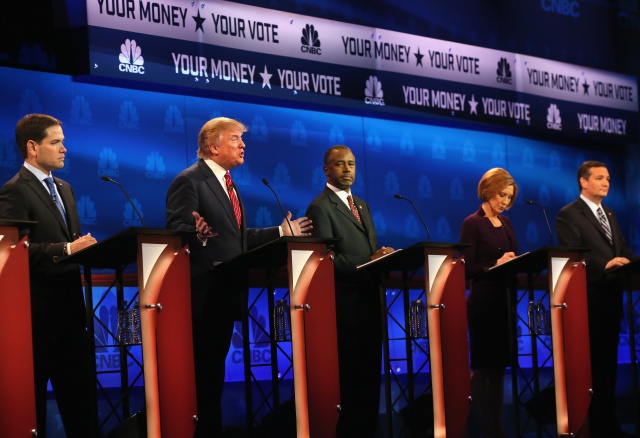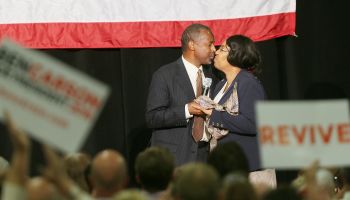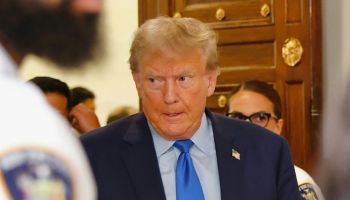NewsOne’s PolitickerOne blog tackles some of the most important topics in politics: Election 2016, moves by the Obama administration, voting rights, lawmaking, and the way that elected officials represent our communities. Three times a week, we will go beyond the mainstream media’s “pack” coverage of politics to highlight the underreported aspects of how politics and policy affect you and the people you care about. In between, follow the conversation on Twitter at #PolitickerOne.
Following the rise of the Black Lives Matter movement, race will certainly be an important factor in the 2016 presidential election.
But with all the negative talk about Blacks, Latinos, and immigrants, most recently Syrian refugees, coming from Republican front-runners Donald Trump and Ben Carson, it’s not clear if the candidates realize they need support from people of color.
Look no further than former Republican presidential candidate Mitt Romney, who was defeated in 2012 by President Barack Obama. A staggering 93 percent of African-Americans, 71 percent of Latinos and 73 percent of Asians supported Obama over Romney. Some of that has to do with the makeup of the political parties. The Democratic Party enjoys the support of 80 percent of the Black population, 56 percent of Latinos, and 65 percent of Asian Americans, according to the Pew Research Center. Supporters of the Republican Party are overwhelmingly White. The Washington Post distills the issue this way:
Democrats began losing the support of White voters after World War II, particularly in the South. During the civil rights movement, white Southerners left the Democratic Party in droves.
Some scholars have argued that changes in the South’s economy caused the party’s decline there. Since wealthier voters tend to be more conservative, it’s plausible that Southerners’ move to the Republican Party is a reflection of the region’s economic growth.
Other historians, though, have long argued that civil rights legislation supported by President Kennedy and other Washington Democrats led to the party’s loss of power in the South. And a study published this month by the National Bureau of Economic Research, based on more than half a century of newly available polling data, supports that interpretation. It was the issue of race, the review of Gallup archives shows, that undid Democrats in the former Confederacy.
But Kiron Skinner, director of the Institute for Politics and Strategy at Pittsburgh’s Carnegie Mellon University, a research fellow at the Hoover Institution, and surrogate to GOP presidential candidate Mitt Romney in 2012, tells NewsOne that African-Americans should look beyond the rhetoric and consider voting Republican in 2016. She is also a foreign policy adviser to Kentucky Sen. Rand Paul’s presidential campaign.
Skinner maps out her reasons in an email Q&A with NewsOne:
1. NewsOne: The Republican Party is mostly White and has been accused of being dismissive of issues of great concern to African-Americans, including criminal justice, education reforms, and unemployment. Why should African Americans vote Republican?
Kiron Skinner: Democratic systems work best when there is political competition within them. That’s good and bad news for African-American voters. It is good news in the sense that if they decide not to always vote with the Democratic Party, there will be intense competition for their vote. The bad news is that African-Americans vote overwhelmingly for the Democratic Party, and this means their vote can be counted on instead of courted. This reality is a powerful contributing factor to why issues of utmost concern for African Americans, like equal opportunity, jobs, and crime reduction, are unevenly (and infrequently) resolved through the political process. One of the reasons the political process is not working for African Americans is that as a race (or a bloc of voters) we have made ourselves too predictable in terms of our voting patterns.
The Smarter Sentencing Act of 2015 (S. 502) is an example of why African-Americans should consider voting Republican. Senators Cory Booker and Rand Paul support this bill. If voted into law, there would be a reduction in jail time for non-violent drug offenders, especially those who had a minimal role, such as possessing drugs or serving as a courier, in the offense at issue. This is the kind of bipartisan leadership that opens the doors for African Americans to consider the Republican Party as an alternative for having their concerns addressed through public policy.
NO: None of the current slate of candidates, except for Sen. Marco Rubio, have made a great impression with their knowledge of foreign policy. But even Rubio is coming under fire for flip-flopping on Syria, pivoting recently to a more hawkish position. Why should Americans consider Trump, whose policy would be to “knock the hell out of” ISIS, or Carson, whose own aides acknowledge he is weak on foreign policy after some major blunders?
KS: I would suggest that American voters closely review Sen. Paul’s foreign policy record. Since joining the U.S. Senate, Paul has been consistently making thoughtful, careful, and insightful comments about America’s role in the world. He is the senator and presidential candidate who is making sure that we balance security and privacy as we and our allies face threats from radical terrorists in the Middle East.
In his recent Time magazine article, Paul said instead of calling for more U.S. boots on the ground in Syria and Iraq, he wants Washington leaders to focus on the financial and ideological sources of terrorism, such as certain Persian Gulf States and political organizations in the region.
3. NO: You worked on Mitt Romney’s campaign in 2012. What was that like?
KS: I was a foreign policy surrogate during the final stretch of Gov. Romney’s presidential bid.
As I agreed with the governor’s call for a robust foreign policy that would not have allowed a precipitous pullout of the Iraq, which happened in 2011, I did media work on his behalf. I was honored to be part of a presidential campaign at a high level, but I wish the governor had been able to more forcefully challenge President Obama’s doctrine of pulling out of Iraq and Afghanistan and then declaring that the wars had ended. *The Obama Doctrine has contributed to the instability in the Middle East because a political void was created by America’s confusing retreat. It was difficult to convey that message in 2012. As we see now, however, it will be a central theme in the 2016 presidential race.
The United States is so indispensable to the functioning of the international system that any sustained retreat will be met with chaos. If the United States is not present to lead international negotiations as well as contribute mightily to the functioning of international institutions and norms, inferior outcomes happen all over the place. I just don’t think the Romney campaign could articulate the case as clearly in 2012 as presidential candidates from both parties should be able to do in 2016. After the terrorist attacks in France and Mali, there is no way that presidential contenders can avoid developing a grand strategy.
[*Some argue that President George Bush’s decision to disband the Iraqi Army after overthrowing Saddam Hussein’s government led to the problems.]
4. What is Republican foreign policy? And which candidate represents your views as a voter?
KS: A Republican foreign policy must be rooted in core American principles of the common defense—the first responsibility of government is the safety and security of its people. It seems to me that a clear articulation of what the common defense means is missing in the way that the White House has responded to the recent terrorist attacks in France and Mali.
Furthermore, we simply must abandon the rhetorical evasion of not calling the threat what it is: Radical Islamists seek to do harm to other Muslims and the West more broadly. This by no means suggests that we are war with Muslims or Islam. We are facing a global threat from terrorists. We cannot have a strategy if we do not even know (or agree) on the nature of the threat.
My ideal Republican foreign policy, would be respectfully, but accurately, making plain to the American public (and the world) the military and political requirements of being in a global war against terrorists. It will tie back those requirements to the first responsibility of government—political and territorial sovereignty. In other words, the United States will use all instruments of power, from diplomacy to negotiations and the projection of military power, to bring an end to terrorism, the global conflict of the 21st century.
SOURCE: Washington Post | PHOTO CREDIT: Getty
SEE ALSO:
Could Donald Trump’s Latest Stunts Cost Him The GOP Presidential Nomination?

























